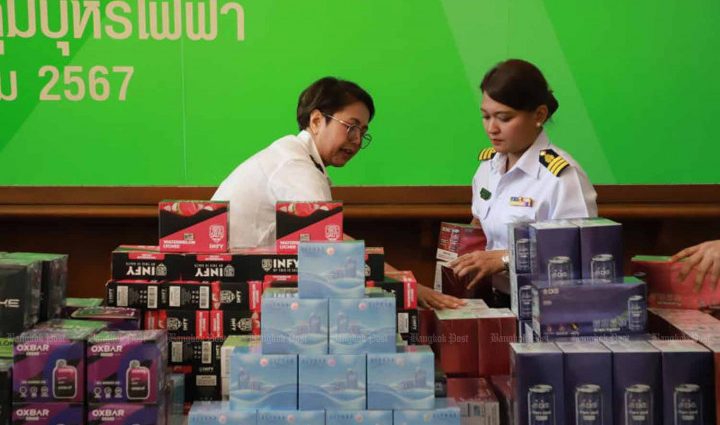Traditional cigarette use continues to decline while strictly enforced ban keeps e-cig use down

Brazilian tobacco experts have backed Thailand’s ban on e-cigarettes, noting that Brazil’s 14-year ban has led to a continued decrease in traditional cigarette smoking without a corresponding increase in e-cigarette usage and recommended using medical evidence to counter tobacco company lobbying.
Authorities can use medical evidence to counter tobacco company lobbying, they told an academic conference held on Tuesday by the Faculty of Medicine at Ramathibodi Hospital, Mahidol University.
Dr André Luís Oliveira da Silva, a tobacco control expert with the Brazilian National Health Surveillance Agency (Anvisa), shared his experience in pushing for legislation to ban e-cigarettes, opposing interference from tobacco companies and speaking out against e-cigarettes in Brazil.
Brazil issued a new e-cigarette law in April, which offers a more comprehensive definition of the products and covers all types, including refillable (general e-cigarettes and pods), dry (heat does not burn), and hybrid (both refillable and tobacco leaf).
It also encompasses all vaping devices and liquids, whether extracted from tobacco leaves or synthetic. The law prohibits the production, importation, marketing, distribution, storage, transport, all forms of advertising, and use of e-cigarettes in public places.
Dr da Silva said Brazil had reaffirmed its ban on e-cigarettes because of clear medical evidence that they pose a hazard to health.
Furthermore, e-cigarettes are found to attract children and adolescents, increasing their smoking rates three-fold, especially with the spread of pod-style devices.
This has led to a global increase in e-cigarette usage among children, posing significant dangers. Preventing the health and social impacts on children and adolescents is a crucial reason for Brazil’s decision to maintain and tighten the e-cigarette ban, he said.
“Brazil also faces interference from tobacco companies, similar to Thailand, including research distortion, lobbying policymakers and government officials and using media advertising,” said Dr da Silva.
“However, what led the Brazilian government to uphold the e-cigarette ban is their social responsibility and reliance on medical evidence in policy-making, prioritising recommendations from medical institutions over business demands.”
Dr Roengrudee Patanavanich from the Department of Community Medicine at Ramathibodi Hospital, said Brazil offered many useful lessons for Thailand.
“I would like to suggest to the government, relevant ministries and the committees considering e-cigarette laws to take lessons from Brazil, which uses medical evidence as the basis for policy-making and to adopt Brazil’s e-cigarette legislation as a guideline,” she said.

